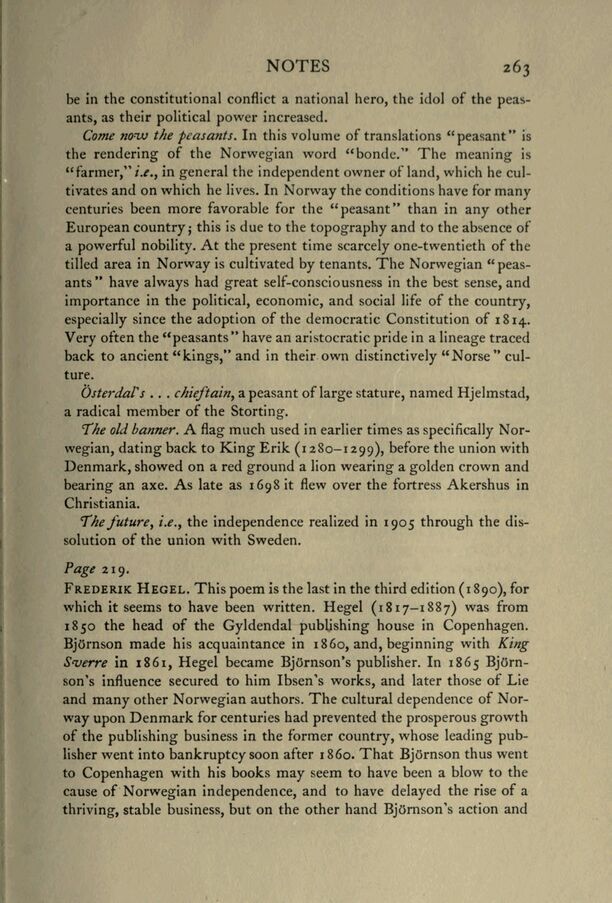
Full resolution (JPEG) - On this page / på denna sida - Sidor ...

<< prev. page << föreg. sida << >> nästa sida >> next page >>
Below is the raw OCR text
from the above scanned image.
Do you see an error? Proofread the page now!
Här nedan syns maskintolkade texten från faksimilbilden ovan.
Ser du något fel? Korrekturläs sidan nu!
This page has never been proofread. / Denna sida har aldrig korrekturlästs.
NOTES 263
be in the constitutional conflict a national hero, the idol of the peas-
ants, as their political power increased.
Come now the peasants. In this volume of translations “peasant” is
the rendering of the Norwegian word “bonde.” The meaning is
“farmer,” i.é., in general the independent owner of land, which he cul-
tivates and on which he lives. In Norway the conditions have for many
centuries been more favorable for the “peasant” than in any other
European country ; this is due to the topography and to the absence of
a powerful nobility. At the present time scarcely one-twentieth of the
tilled area in Norway is cultivated by tenants. The Norwegian “ peas-
ants” have always had great self-consciousness in the best sense, and
importance in the political, economic, and social life of the country,
especially since the adoption of the democratic Constitution of 1814.
Very often the “‘peasants”’ have an aristocratic pride in a lineage traced
back to ancient “kings,” and in their. own distinctively “Norse” cul-
ture.
Osterdal’s .. . chieftain, a peasant of large stature, named Hjelmstad,
a radical member of the Storting.
The old banner. A flag much used in earlier times as specifically Nor-
wegian, dating back to King Erik (1280-1299), before the union with
Denmark, showed on a red ground a lion wearing a golden crown and
bearing an axe. As late as 1698 it flew over the fortress Akershus in
Christiania.
The future, i.e., the independence realized in 1905 through the dis-
solution of the union with Sweden.
Page 219.
FREDERIK HEGEL. This poem is the last in the third edition (1890), for
which it seems to have been written. Hegel (1817-1887) was from
1850 the head of the Gyldendal publishing house in Copenhagen.
Bjérnson made his acquaintance in 1860, and, beginning with King
Sverre in 1861, Hegel became Bjérnson’s publisher. In 1865 Bjérn-
son’s influence secured to him Ibsen’s works, and later those of Lie
and many other Norwegian authors. The cultural dependence of Nor-
way upon Denmark for centuries had prevented the prosperous growth
of the publishing business in the former country, whose leading pub-
lisher went into bankruptcy soon after 1860. That Bjérnson thus went
to Copenhagen with his books may seem to have been a blow to the
cause of Norwegian independence, and to have delayed the rise of a
thriving, stable business, but on the other hand Bjérnson’s action and
<< prev. page << föreg. sida << >> nästa sida >> next page >>